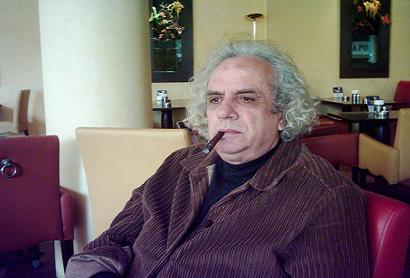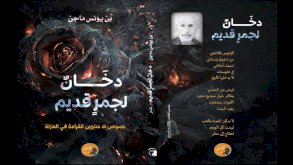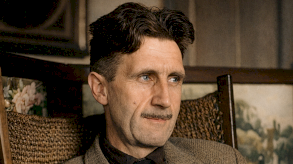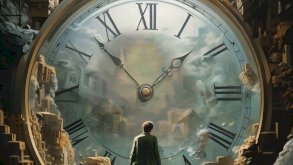The poem as a relic of the unpronounceable

In the heart of an experimentation which reveals the vacuity of all the poetic subterfuges that the poets of his generation over used, Paul Chaoul in his poetry, never claimed to speak in the name of all: a poet is his own manifest.
In 1984, he publishes two works opposite in their form: Vacant air and Commemorative Death. The first is a collection where the poem finds, as Claudel underlined it, in the large Blanc which surrounds it quot;the very condition of its existence, its life and its breathingquot;. In the second on the contrary, it, drawing through accumulation the real function of the thought, sets up a black block of tales and short parts.
As a matter of fact, his poetry always alternates between the nudity of the word and its symbolic contents, between vacancy, where the words evolve quite freely in a large typographical whiteness, and recollection when a host of words tighten the rows of the unknown and call forth others. If the forms of each one of his works are imposed by the very needs of poem, and if the style of Paul Chaoul tends to juxtapose in his own manner two different realities in order to create vivid figures, his poetical opus represent at the same time rupture and continuity. Here, verse and prose, minimalism and opulence, figure and appropriate meaning become infinitely entangled up until they fuse together in a quot;total perceptionquot;. (A. K. El Janabi)
PAUL CHAOUL: Leaves of the absent one
Excerpts
In the room the body does not reveal its scope.
It lacks bulk or wind to touch it.
In the room the body is not aroused.
It needs faculties or words to retain it.
The body in the room, his hands donrsquo;t find it.deg;
The Body of the absent one.
*
A child whose mirror is made from his tears counts his fingers with his eyes. And every time he counts his fingers he weeps.
His mirror is made from his tears. An orange rolls from his head down to his voice and I donrsquo;t heart it.
A swift jumps off his face and falls dead in my eyes.
*
What are your quiet lips staring at?
A yellow kiss encloses the garden behind you.
The dead seek their wounds.
What are your quiet lips staring at?
A yellow kiss closes the garden behind you.
The dead whisper their ages to you and cool off. .
*
The abandoned house up there. The yesterdayrsquo;s house. In front of which is a china tree, behind it a cypress and inside it there is a bathroom. The house abandoned there. The one that the child left one of theses previous seasons..
The child whose hand was blowing clouds in the sky so they follow it.
Antecedent clouds.
*
What are your quiet lips staring at?
A prey thrown from the window and dies on your face.
The body slips from one room to another.
The moment of the dead enlightens the other rooms.
*
What are your quiet lips staring at?
The dead spend the night in the garden in pleasant
Conversation and you hear them.
*
In the room there is a silence. A lamp clarifies the ambiguous bulks. A wind follows the one who walks in the street. The one who walks along the street follows a body that he does not know. In the room there is a silence. A lamp enlightens ambiguous bulks. Men, women and warriors dying, follow the one who walks in the street. The one who walks along the street follows a body that he does not know.
In the room there is a silence. A lamp enlightens ambigous bulks. A face apologizes in a long silence.
*
A window in your body opens and closes itself
A window, which does not see you.
How cumbersome is your absence!
Who will breathe all this night above my head
And will not answer him
How oppressive is your absence!
Who will breathe above my head all this night
So that I will not answer him.
*
Since the morning, the absent one has opened his eyes and nobody has seen him.
The lantern which he gards keeps watching over him.
Since the morning, the absent one has opened his eyes and nobody has seen him
The closed window, which guards him stays closed, and watching him.
Since the morning, the absent one has opened his eyes and nobody has seen him
The closed door which gaurds him stays closed and watching him.
Since the morning, the absent one has opened his eyes and nobody has seen him.
His steps which exclude him resound on the paving stone of the empty city.
Since the morning, the absent one has opened his eyes and nobody has seen him
An obscure fire he sees in front of him.
*
In my mouth, dry words.
The warriors lie under trees which do not dream nor sleep.
Trees which chatter with old water of these warriors. .
*
How could a mirror contain
All this extinction?
*
My eyes in the ceiling
Staring at what cannot see
My eyes in the ceiling
Betray the dead at the peak of their grief.
*
A light. A room. A bed. A door. A window. A face erased by the light. A bed. A gate. A window. The face of the silent one.
Outside, the warriors practise familiar rites.
The women climb the trees, hold up axes and crying.
On the mountains, the willow is immersed in an unknown dust.
The face of the silent one is buried by his own hands.
*
This alien thing, which reside in every thing.
You raise a door in front of you. A door, which has no ceiling, no walls, no bolt. A door that you knock at many times and no answer. Then you cross its threshold.
Its lost threshold.
This alien thing, which reside in every thing.
*
Women going too far in the broadnight
Take off their bodies and wave them
I climb the window and I donrsquo;t see them.
*
Shadows cross my room, smuggle their names into darkness fold and disappear with no caps, nor matches or cough. They disappear without leaving air behind them, these shadows that cross my room pull off their names from my chest and disappear with no caps, nor matches or cough.
*
All of a sudden the friends heap up
In the snows
In order to melt away.
Two hands are burningdeg;
Under the tears.
*
I have been walking for a few days. I count in a low voice the trees. The caps. The streets. In low voice. I walk in a low voice past a few trees. And caps and streets. I walk for a few years in a low voice. A few voices lower in the trees, caps and walls.
For a few deaths...
*
A hat on the pavement and nobody collects it.
A coat falls
Behind me.
*
A sleep, which does not resemble the dead.
A dust of infidel body
A dust of a sleep
Which does not resemble the dead
A dust of a body
A dust of the dead.
Something flies in the room
And it does not reach you
Something from the dust of dead
From the dust of an infidel body
Rushes in the room and does not reach you.
*
Where is this fire from,
Which step
By step
Burn the leaves
In your passage
Under your face
*
Nothing is left
Except
Infidel looks
Which the naked wall alternates
And this
Empty chair.
*
His voice left no shadow on the faces of the dead, when he breathed and fell hush
Something burns in the room and consumes the end of his lips.
Something is burning in the room,
In rhythm
with his voice.
*
The absent one
Is at a loss
Where
To hide
His voice
Before
Opening
His hands.
*
Air, which draws a line between
The bodies
The chairs
And the breaths.
An infidel air
Between his hands
A thirst
Which sever
This forest
With no
Regret.
Translated from Arabicby A. K. El Janabi









التعليقات